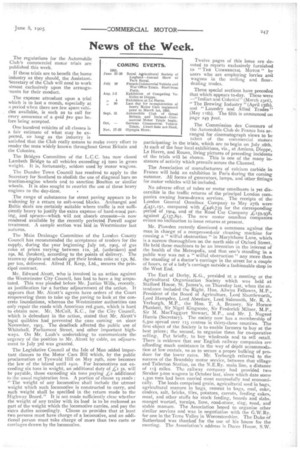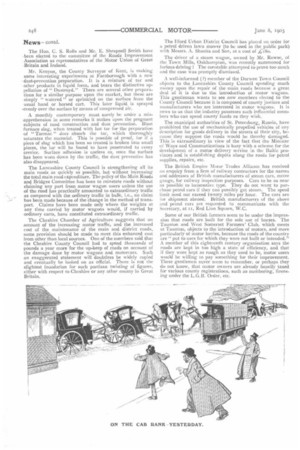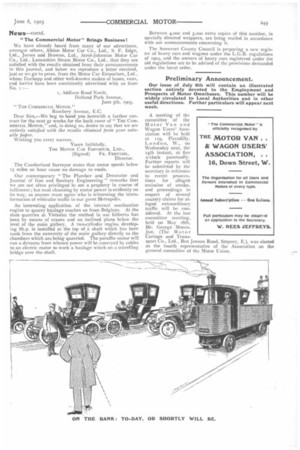News of the Week.
Page 3

Page 4

Page 5

If you've noticed an error in this article please click here to report it so we can fix it.
The regulations for the Automobile Club's commercial motor trials are published this week.
If these trials are to benefit the home industry as they should, the AssistantSecretary of the Club will need to work -almost exclusively upon the arrangements for their conduct.
The expense attendant upon a trial which is to last a month, especially at a period when there are few spare vehicles available, is such as to call for every assurance of a quid ibto quo before being accepted.
One hundred vehicles of all classes is a fair estimate of what may be ex pected, so long as the industry is satisfied that the Club really means to make every effort to render the tests widely known throughout Great Britain and the Colonies.
The Bridges Committee of the I,.C.C. has now closed Lambeth Bridge to all vehicles exceeding 2A tons in gross weight. It is, fortunately, seldom used by motor wagons.
The Dundee Town Council has resolved to apply to the Secretary for Scotland to abolish the use of diagonal bars on traction-engine wheels and to sanction Boulton or similar wheels. It is also sought to restrict the use of these heavy engines to the day-time.
The range of substances for street paving appears to be widening by a return to soft-wood blocks. Archangel and Baltic deals are certainly suitable where traffic is not sufficiently heavy to justify the extra expense of hard-wood paving, and spruce—which will not absorb creosote—is now rendered available by the recently perfected Powell sugar treatment. A sample section was laid in Westminster last autumn.
The Main Drainage Committee of the London County Council has recommended the acceptance of tenders for the supply, during the year beginning July 1st, 1905, of gas coke at prices varying between xis. 3d. (unbroken) and 19s. 8d. (broken), according to the points of delivery. The tramway depots and schools get their broken coke at is. 8d. per ton, delivered. Alfred H. Keep, Ltd., secures the principal contract. Mr. Edward Alcott, who is involved in an action against the Westminster City Council, has had to have a leg amputated. This was pleaded before Mr. Justice Wills, recently, as justification for a further adjournment of the action. It appears that Mr. Alcott's agents have orders of the Court empowering them to take up the paving to look at the concrete foundations, whereas the Westminster authorities can only repair the roads with American red gum, which is hard to obtain now. Mr. McCall, K.C., for the City Council, which is defendant in the action, stated that Mr. Alcott's legal quibbles had prevented the case coming on since November, 1903. The deadlock affected the public use of Whitehall, Parliament Street, and other important highways. On Mr. Lush's undertaking to communicate the urgency of the position to Mr. Alcott by cable, an adjournment to July 3rd was granted.
The Legislative Council of the Isle of Man added important clauses to the Motor Cars Bill which, by the public proclamation at Tynwald Hill on May 29th, now becomes the law of the island until 1910. For locomotives not exceeding six tons in weight, an additional duty of Zi 5s. will be payable, those exceeding six tons paying additional to the usual registration fees. A portion of clause 19 reads : "The weight of any locomotive shall include the utmost weight which such locomotive is constructed to carry, and such weight shall be specified in the return made to the Highway Board." It is not made sufficiently clear whether the weight of any trailer with its load is to be reckoned as part of the weight which the locomotive carries, and pay the extra duties accordingly. Clause 20 provides that at least two persons must have charge of a locomotive, and an additional person must take charge of more than two carts or carriages drawn by the locomotive. Twelve pages of this issue are devoted to reports exclusively furnished to "THE COMMERCIAL MOTOR" by users who are employing lorries and wagons in the milling and flourdealing trades.
Three special sections have preceded that which appears to-day. These were —"Indian and Colonial" (March 23rd), "The Brewing Industry "(April 13th), and "Laundry and Allied Trades" (May itth). The fifth is announced on page 249 post.
The Commission des Concours of the Automobile Club de France has arranged for cinematograph views to be taken of the commercial motors participating in the trials, which are to begin on July 28th. At each of the four local exhibitions, viz., at Amiens, Dieppe, Le Havre, and Rouen, living pictures of preceding incidents of the trials will be shown. This is one of the many instances of activity which prevails across the Channel.
The Association of manufacturers of calcium carbide in France will hold an exhibition in Paris during the coming summer. All forms of generators, lamps, and other fittings for motor vehicles will be included.
No adverse effect of tubes or motor omnibuses is yet discernible in the traffic returns of the principal London companies owning horse-drawn services. The receipts of the London General Omnibus Company to May 27th were ,451,191, compared with ,6446,739 for the corresponding period of 19°4., and of the Road Car Company £159,938, against £157,891. The new motor omnibus companies evince no inclination to issue returns at present.
Mr. Plowden recently dismissed a summons against the man in charge of a compressed-air cleaning machine for causing a "wilful obstruction" in Marytebone Lane, which is a narrow thoroughfare on the north side of Oxford Street. Ile held these machines to be an invention in the interest of the health of the Metropolis, and that one's standing in a public way was not a "wilful obstruction" any more than the standing of a doctor's carriage in the street for a couple of hours, or of a lady's carriage outside a fashionable shop in the West End.
The Earl of Derby, KG., presided at a meeting or the Agricultural Organisation Society which was held at Stafford House, St. James's, on Thursday last, when the attendance included the Right. Hon. Ailwyn Fellowes, M.P., President of the Board of Agriculture, Lord Shuttleworth, Lord Hampden, Lord Aberdare, Lord Sidinouth, Mr. R. A. Yerburgh, M.P., the Hon. T. A. Brassey, Sir Horace Plunkett, Sir Nigel Kingstote, Sir Frederick Milner, M.P., Sir M. MacTaggart Stewart, M.P., and Mr. J. Nugent Harris (Secretary). The society now has a membership of 6,5oo spread over 113 centres in thirty-three counties. The first object of the Society is to enable farmers to buy at the best prices ; the second, to organise them for co-operative selling. Put briefly, to buy wholesale and to sell retail. There is evidence that our English railway companies are affording much assistance in the way of depot accommodation at low rentals, so as to secure a proper bulking of produce for the lower rates. Mr. Yerburgh referred to the success of the Bra ndsby motor service, between that village and Tollerton Station, on the N.E.Ry. main line, a distance of rti. miles. The railway company had provided two Straker 5-ton wagons in October last, since which date some 1,5oo tons had been carried most successfully and economically. The loads comprised grain, agricultural seed in bags, agricultural manure in bags, cement in bags, coal, coke, cinders, salt, bricks, tiles, potatoes, carrots, feeding cakes, meal, and other stuffs for stock feeding, boards and slabs, mangel wurtzel, turnips, lime, road-stone, slag, sand, and stable manure. The Association hoped to organise other similar services and was in negotiation with the G.W.Ry. for one in the Teme Valley in Worcestershire. The Duke of Sutherland was thanked for the use of his house for the meeting. The Association's address is Dacre House, S.W.
The lion. C. S. Rolls and Mr. E. Shrapnel! Smith have been elected to the committee of the Roads Improvement . Association as representatives of the Motor Union of Great • Britain and Ireland.
Mr. Kenyon, the County Surveyor of Kent, is making some interesting experiments at Farnborough with a new ,dust-prevention preparation. It is a mixture of tar and other products in liquid form, and bears the distinctive appellation of " Dustrayd." There are several other preparations for a similar purpose upon the market, but these are simply " watered " or sprinkled on the surface from the usual hand or horsed cart. This later liquid is sprayed .evenly over the surface by means of compressed air.
A monthly contemporary must surely be under a miss .apprehension in some remarks it makes upon the pregnant subjects of road construction and dust prevention. Blast furnace slag, when treated with hot tar for the preparation of "Tarmac " does absorb the tar, which thoroughly saturates the material. This is possible of proof, for if a piece of slag which has been so treated. is broken into small pieces, the tar will be found to have penetrated to every crevice. Surface adhesion is useless as, once the surface has been worn down by the traffic, the dust preventive has also disappeared.
The Lancashire County Council is strengthening all its main roads as quickly as possible, but without increasing the total main road expenditure. The policy of the Main Roads and Bridges Committee has been to reinstate roads without claiming any part from motor wagon users unless the use of the road has practically amounted to extraordinary traffic as compared with the ordinary traffic in bulk, i.e., no claim has been made because of the change in the method of transport. Claims have been made only where the weights at any time carried by motor wagons would, if carried by .ordinary carts, have constituted extraordinary traffic.
The Cheshire Chamber of Agriculture suggests that on account of the increasing motor traffic, and the increased cost of the maintenance of the main and district roads, some provision should be made to meet this enhanced cost from other than local sources. One of the members said that the Cheshire County Council had to spend thousands of pounds a year more for the up-keep of roads on account of the damage done by motor wagons and motorcars. Such an exaggerated statement will doubtless be widely copied and eventually be looked on as official. There is not the slightest foundation for such partisan twisting of figures, either with respect to Cheshire or any other county in Great Britain. The Ilford Urban District Council has placed an order for a petrol driven lawn mower (to be used in the public park) with Messrs. A. Shanks and Son, at a cost of 4180.
The driver of a steam wagon, owned by Mr. Rowse, of the Town Mills, Onkharnpton, was recently summoned for furious driving ! The constable attempted to prove too much and the case was promptly dismissed.
A well-informed (?) member of the Darwen Town Council objects to the Lancashire County Council spending much money upon the repair of the main roads because a great deal of it is due to the introduction of motor wagons. This gentleman wants to see new members elected to the County Council because it is composed of county justices and manufacturers who are interested in motor wagons. It is news to us that the industry possesses such influential members who can spend county funds as they wish.
The municipal authorities of St. Petersburg, Russia, have prohibited the use of mechanically propelled vehicles of any description for goods delivery in the streets of their city, because they suppose the roads would be thereby damaged. This is extraordinary in view of the fact that the Minister of Ways and Communications is busy with a scheme for the development of a motor delivery service in the Baltic provinces and is establishing depots along the roads for petrol supplies, repairs, etc.
The British Empire Motor Trades Alliance has received an enquiry from a firm of railway contractors for the names and addresses of I3ritish manufacturers of steam cars, metre gauge, for railway inspection purposes. Cars to be as near as possible to locomotive type. They do not want to purchase petrol cars if they can possibly get steam. The speed limit need not exceed twenty miles per hour. The cars are for shipment abroad. British manufacturers of the above and petrol cars are requested to communicate with the Secretary, at ii, Red Lion Square, W.C.
Some of our British farmers seem to be under the impression that roads are built for the sole use of horses. The Taunton and West Somerset Farmers' Club, which meets at Taunton, objects to the introduction of motors, and more particularly of motor lorries, because the roads of the country are " put to uses for which they were not built or intended. A member of this eighteenth century organisation says the roads are kept in too high a state of efficiency, and that if they were kept as rough as they used to he, motor users would be willing La pay something for their improvement. These gentlemen never seem to remember, or perhaps they do not know, that motor owners are already heavily taxed for various county registrations, such as numbering-, licensing under the L.G.B. Order, etc.
"The Commercial Motor '• Brings Business!
We have already heard from many of our advertisers, amongst others, Albion Motor Car Co., Ltd., S. F. Edge, Ltd., James and Browne, Ltd., Arrol-Johnston Motor Car Co., Ltd., Lancashire Steam Motor Co., Ltd., that they are satisfied with the results obtained from their announcements in this journal, and below we reproduce a letter received, just as we go to press, from the Motor Car Emporium, Ltd., whose Durkopp and other well-known makes of buses, vans, and lorries have been consistently advertised with us from No. i:—
Dear Sirs,—We beg to hand you herewith a further contract for the next 52 weeks for the back cover of" THE COMMERCIAL Mo'roe," and, in doing so, desire to say that we are entirely satisfied with the results obtained from your valuable paper.
Wishing you every success.
The Cumberland Surveyor states that motor speeds below is miles an hour cause no damage to roads, Our contemporary "The Plumber and Decorator and Journal of Gas and Sanitary Engineering" remarks that we are not often privileged to see a prophecy in course of fulliiment; but road cleansing by motor power is evidently on its way, as anyone must agree who is witnessing the transformation of vehicular traffic in our great Metropolis.
An interesting application of the internal combustion engine to quarry haulage reaches us from Belgium. At the slate quarries at Vielsalm the method in use hitherto has been by means of cranes and an inclined plane below the level of the main gallery. A two-cylinder engine developing 8h.p. is installed at the top of a shaft which has been sunk from the extremity of the main gallery directly to the chambers which are being quarried. The paraffin motor will run a dynamo from whence power will be conveyed by cables to an electric motor to work a haulage winch on a travelling bridge over the shaft. Between 4,000 and s,000 extra copies of this number, in specially directed wrappers, are being mailed in accordance with our announcements concerning it.
The Somerset County Council is preparing a new register of heavy cars and wagons under the L.G.B. regulations of 19o, and the owners of heavy cars registered under the old regulations are to be advised of the provisions demanded under the latest order.
Preliminary Announcement.
Our issue of July 6th will contain an illustrated section entirely devoted to the Employment and Prospects of Motor Omnibuses. This number will be widely circulated to Local Authorities and in other useful directions. Further particulars will appear next week.
A meeting of the committee of the Motor Van and Wagon Users' Association will be held at 119, Piccadilly, London, W., on Wednesday next, the
instant, at five o'clock punctually. Further reports will be submitted by the secretary in reference to recent prosecutions for alleged emission of smoke, and proceedings in respect of several country claims for alleged extraordinary traffic will be considered. At the last committee meeting, held on May t8th, Mr. George Monro, Jun. (The Motor Cartage and Transsport Co., Ltd., Ben Jonson Road, as the fourth_ representative of general committee of the Motor Union.


























